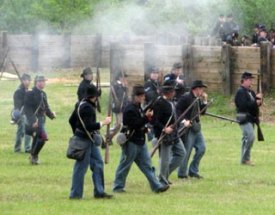
Filmmaker Edward T. McDougal’s inspiring historical feature, “Dog Jack,” opens theatrically nationwide in celebration of February’s Black History Month — a year after the distributor discovered this gem at a regional film festival.
The story – narrated by Lou Gossett, Jr. – is about young runaway slave Jed and his dog, who join the Pennsylvania 102nd Volunteers and must face a Confederate Army regiment led by Jed’s former master.
McDougal, of Northbrook-based McDougal Films, has been producing award-winning Christian, family-directed and non-profit films aimed at helping urban youth for 15 years.
Indie cinema filmmaker Julian Grant sat down with McDougal, who wrote the script and co-produced with his long-time associate Don Albert, to talk about his 20-year odyssey in getting the story to screen.
GRANT: How long has “Dog Jack” been a labor of love?
McDOUGAL: Since the mid-‘80s, when the author, Florence Biros, and I first shared the vision of turning the story into a film.
GRANT: When did you finally get into production?
McDOUGAL: We shot in 2005 and finally finished in 2009. We started entering the film in film festivals in 2010, where it began taking key awards. It was the audience choice in San Diego, where it made everyone cry. I was speechless.
GRANT: And distributor Screen Media Films discovered it at the St. Louis Film Festival.
McDOUGAL: They tested the waters in select Illinois markets over the holidays and the film did very well. It’s just been released on DVD, Netflix and Video on Demand.
GRANT: You have hundreds of actors and battlefield scenes. How did you recruit your reenactors?
 McDOUGAL: We sent out mass Emails all over the Midwest, within a 400 mile radius of Chicago. The reenactors who responded were enthusiastic and gave of themselves in the battle scenes. The largest group of 60 reenactors was located in Gettysburg. They had everything, cannons, guns, horses.
McDOUGAL: We sent out mass Emails all over the Midwest, within a 400 mile radius of Chicago. The reenactors who responded were enthusiastic and gave of themselves in the battle scenes. The largest group of 60 reenactors was located in Gettysburg. They had everything, cannons, guns, horses.
We shot the close scenes, with a lot of dialog, in Illinois. It was a juggle. In one case we have Jed run from one group we shot in Pennsylvania, into a small group of soldiers — Goodman Theatre actors – we shot in Illinois.
GRANT: Where did you find Benjamin Gardner, the actor who plays Jed?
McDOUGAL: Ben, then 15, was one of 11 kids who came to auditions. He was a bright young man, a basketball star, just entering an all white school. As a newcomer, he faced personal challenges.
 GRANT: Where is he now?
GRANT: Where is he now?
McDOUGAL: He’s now about 21 and trying to get back into acting.
GRANT: Did you have trouble casting Jack the Dog or was he already a trained dog when you found him?
McDOUGAL: Finding “Jack” was a gift from God – like the distributor finding us. After sending out mass calls in the Chicago area, we had a dog audition with 12 to 15 dogs and discovered a dead ringer for “Jack,” a pit bull — Piglet, a three-year old deaf dog, who we had professionally trained.
GRANT: This must have been a big budget production, with a crew of 35, a large cast, travel expenses, a three month shoot.
McDOUGAL: Actually, it was a low-budget indie film. Even with a limited budget and resources, I was determined that “Dog Jack” would be as authentic as possible.
Every area of the production was led by people at the top of their craft – probably the best in Chicago — people who made enormous sacrifices financially and time-wise, for which I am forever grateful.
Credits: Producers: Edward T. McDougal, Don Albert. Co-producers: Seneca Lester, associate and line producer; Daniel Hanson, Joshua Russell, associate producer. DP: Michael N.J. Wright. Editor: Vanessa Newell. Original music, Timo Elliston. Casting: Tony DeGuide, Basia Emano. Production design: Richard Hargreaves, Valarie Hargreaves. Art director: Audra Esch. Costume design: Michael Alan Stein.
















